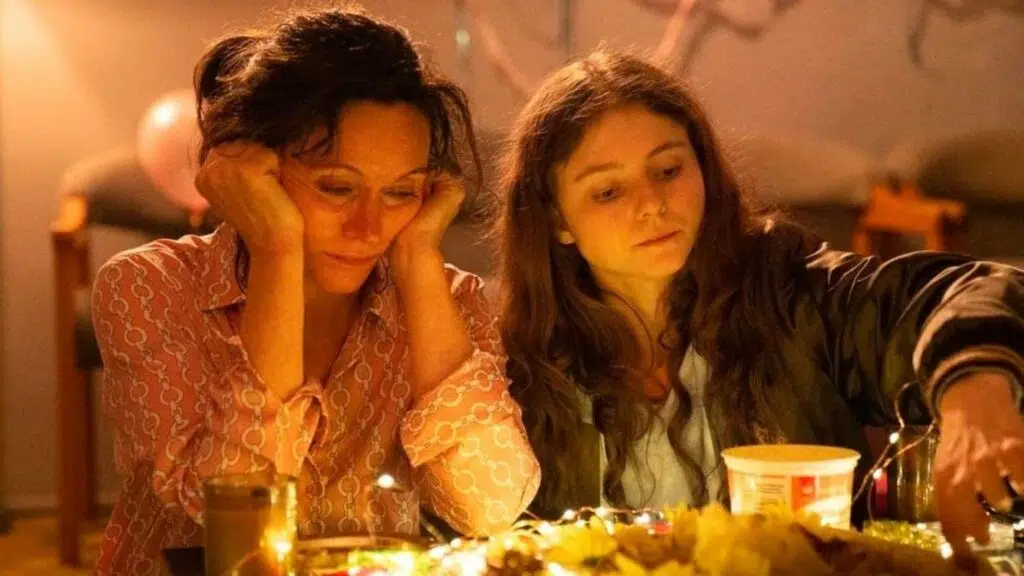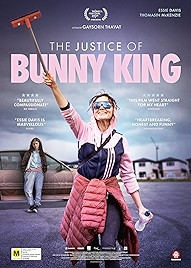One woman’s triumph against adversity – now there’s a phrase to chill the blood. Here’s what it says right under the title on the IMDb page for The Justice of Bunny King. “A triumph over adversity tale of women fighting their way back from the bottom of the barrel.” I don’t know who wrote that but what director Gaysorn Thavat’s debut feature serves up is a horse of a very different colour.
The films of Ken Loach provide the most obvious reference point, particularly Cathy Come Home, one of a string of TV “plays” Loach made for the BBC in the mid 1960s. It told the story of one woman trying to triumph against adversity and crashing on the rocks of the indifference of the welfare state. The Justice of Bunny King does something very similar.
When we meet Bunny (Essie Davis), she’s “working” as a squeegee jockey at a crossroads, relying largely on the charity of her temporarily captive driver-audience as she cleans the gak off their windscreens, whether they need it or not.
She seems to be a lively, bright, smiling woman doing a shitty job with good humour. But as Sophie Henderson’s carefully paced screenplay pulls back a touch, we learn more. Bunny has been in prison, for killing her husband. Self-defence, she says. Her kids are in care and Bunny stands no chance of getting them back until she can find a place to live. Currently she’s staying on her sister’s sofa, a precarious billet that suddenly blows up in her face when she intervenes after seeing her sister’s husband getting over-cosy with his teenage step-daughter.
The two women – Bunny and her niece Tonyah (Thomasin McKenzie) end up on the run together. It does not end well.
The same quality that made Cathy in Cathy Come Home so heartbreakingly watchable is evident in Bunny – she’s her own worst enemy. Smart, passionate and principled she may be but she’s also impetuous, hotheaded and a bit careless. As Bunny runs into one misadventure after another – with family, kids, social services, estate agents, foster parents – it’s the story of there being many a slip twixt cup and lip. Bunny reaches, only discover that what she’s after has moved further from her grasp.
Henderson writes Bunny as a complex character and Essie Davis plays her as one. It’s a great performance, and a suprising one if you only know Davis from the Miss Fisher Murder Mysteries – no matter what bright face Bunny is presenting to the world, Davis keeps up a bagpipe drone of desperation beneath.
Nuance is key. Bunny isn’t blameless. Bunny’s sister wants to help. The foster parents her kids end up with aren’t unfeeling. Social services are bureaucratic but not officious. At a late point in the film when things have gone really to the bad and the cops are on the way, one social worker (played very adroitly by Tanea Heke) demonstrates that there is room for human warmth even in the government machine.
Gaysorn Thavat opts for a midway point between faux documentary style and TV drama, keeping the camera tight in on Davis and only pulling back for medium shots when she’s interacting with third parties. It’s careful and deliberately unshowy, much as Karl Steven’s score is – muted banjoes jingle-jangle away. Everyone, everyone, is trying to avoid mawkishness, so easy to dip into when one woman’s triumph over adversity is beginning to look like it’s going to be anything but.
Back to that IMDb tagline – a “bottom of the barrel” there certainly is. Two women, ditto. A fight, certainly. Adversity, lots of that. It’s the triumph bit that sticks slightly in the craw. But, yes, maybe, as the lights go down on Essie’s latest disastrous attempt to get her life back on track, there might be the merest triumph, a moral one. It depends on how you look at these things.
The Justice of Bunny King – Watch it/buy it at Amazon
I am an Amazon affiliate


